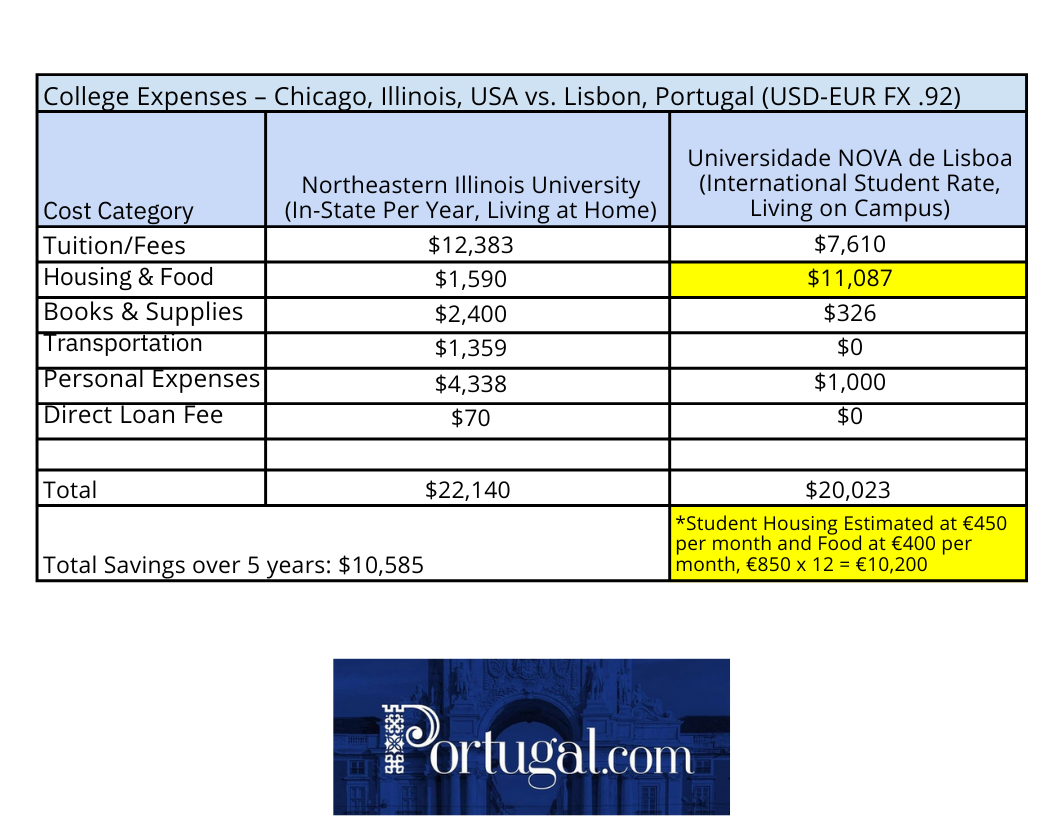Before we compare the difference in costs and experience between going to university in the USA vs. Portugal, I want to briefly mention that all names here have been changed to protect the family’s privacy, but the financial amounts are as close to accurate as we could estimate.
The Current Reality of University Costs in the United States
Any American family preparing to send their children to college these days in the United States knows that costs have skyrocketed in the last 20 years. If prospective students are lucky, they will be eligible for some kind of scholarship. However, if you fall somewhere in the middle or don’t qualify for scholarships due to grades, you are looking at least $10,000 dollars per year for a minimum of four years (which nowadays usually stretches to five years) to receive a Bachelor’s degree. This $10,000 per year only covers tuition alone and is on the low side these days in terms of college tuition for public universities. If you add in books, miscellaneous fees, a meal plan, and the estimated costs of living at home with your parents, this price quickly doubles.

The estimated $20,000 per year to attend an average American university while living at home with your parents also assumes that you go to an in-state college. The price can quickly double again if you go to an out of state university (an average price of $40,000 per year). Add in the cost of having a car on campus, paying to park it, and the costs of socially participating in the current version of what students imagine the American college experience to be, and, boy oh boy, parents are either going to have to work years longer to pay for their children to get their degrees, or students are going to graduate with more debt than ever.
American universities are also now advertising their facilities and ability to entertain rather than educate. Take Louisiana State University (LSU) as an example. As our interviewee for this article Mike Williams put it, “American universities have become like resorts so the kids want to come. They have built a lazy river that spells out LSU. Come to LSU and be in the Lazy River. How can we entertain you? How can we make you want to come?”
The Williams Family Begin the College Search
Mike and Janet Williams are from the Chicago, Illinois area and have one child named Tim. As the time for their son to apply for college drew near, Mike and Janet wanted to ensure that they would pay the entire costs of his education. While they were lucky enough to be able to afford the tuition bills, they were shocked to discover the $22,000 price tag to attend an in-state university in the Chicago area, and this would be the cost if their son commuted to college from home.
While they were thinking about the best place for Tim to enroll, they also started considering where they hoped to retire. Janet ultimately wanted to retire in the US, but Mike suggested that it might be a good idea to explore Europe for several months or even a few years before settling down in the US for good.
Once Mike made the suggestion, Janet soon started researching its feasabillity. She soon started being served ads through social media and Facebook forums advertising the best places to retire. Time and time again, Portugal would make the list, and soon it became the top contender for the Williams Family. Mike and Janet started to crunch the numbers and they asked themselves, “Could we also retire if we all move to Portugal together?” After running several calculations, they realized that the answer was “Yes.” The plan would be to have the entire family live together in Portugal for the first year as Tim adjusted to university in Portugal. Then, Tim would either move into university housing or move in with other students off campus.
For Mike and Janet, giving Tim the chance to live on his own was an important rite of passage that would be more financially feasible in Portugal. Tim also wouldn’t need to have his own car if he attended a university in Lisbon or Porto. Lisbon also scored a 25.52 Level of Crime (Low) score compared to Chicago, Illinois, which scored a 78.37 (High) in the same study according to Numbeo.com.
Choosing the Right Portuguese University
Portuguese universities have a good global reputation and continue to climb in the world rankings. The most important part of choosing a Portuguese university if you’re coming from the United States is making sure that the Portuguese school offers a program entirely in English. These types of programs are limited, so please do your research several months to even a couple of years in advance. Mike and Janet made this mistake when they first visited the Católica Porto Business School, only to find out that the undergraduate economics course was not entirely in English. They then considered ISCTE, the University Institute of Lisbon, before settling on Nova University of Lisbon since Tim wanted to study Business/Economics and Nova offers an all-English program.
Getting into Portuguese University
Tim Williams ultimately decided to apply for Nova University of Lisbon, which ranked first in Portugal in Business and Economics and Arts and Humanities and Top 10 among young European universities founded less than 50 years ago in Business and Economics, Clinical and Health, and Education in the Times Higher Education Ranking By Subject 2021.
Tim had to take a 20-question mathematics pre-test to gauge their preparedness for the Economics program. The test turned out to be a formidable challenge for Tim, who considers himself only average at math. To get in, Tim ended up needing to hire a math tutor and cram a year of math into just a couple of weeks. Seriously, Universidade Nova of Lisbon was that much ahead of what Tim had studied in his Maryland high school. In the end, Tim barely passed the test and was able to get into Nova.
Of course, each program is going to have different requirements and the number of international students is limited, so please do your own research when considering Portuguese universities. And, once again, please ensure that the program will be in a language that you understand before applying.
The Benefits of Attending a Portuguese University vs. Staying in the US
While moving to a new country means leaving behind relationships that you’ve built for a lifetime, the broadening of your perspective by moving to a new country is hard to quantify. For some, it is priceless.
By going to school in Portugal, Tim has access to all of Europe on his school breaks in addition to the chance to work within a global community at his university. He will also get the chance to become fluent in Portuguese. In addition, after being a resident of Portugal for five years as a student, Tim will become eligible for Portuguese citizenship if he decides to apply. This would give him the ability to live and work anywhere in the EU. Many Bachelor’s degrees in Portugal can also be completed in three years, meaning that if Tim finishes five school years in Portugal, he can complete his Master’s degree in the same time that it would likely take him to finish his Bachelor’s degree in the US.
Tim may miss out on networking opportunities in the US and may earn less than they would in the US if they decide to stay and work in the EU. However, learning to speak Portuguese and having international experience may also give him an advantage when coming back to apply for US jobs. The fact that his parents can also retire and be right there to support him in Portugal is an added bonus.
By the Numbers: Illinois, USA vs. Portugal
The numbers below do not take into account the lower cost of living that Mike and Janet will also have in Lisbon compared to Chicago. Public transportation is free in Lisbon for students up to the age of 23 and seniors over the age of 65 as of 2022.

As you can see, the estimated savings is only $10,585 over 5 years. While this may not seem like much, this also assumes that the student will graduate with a Master’s degree in Portugal rather than finishing with only a Bachelor’s in five years in the United States.
Other Portuguese Universities That Offer All-English Undergraduate Programs
If this article inspires you to consider looking into Portuguese universities, we advise you to start with the following schools and ask about their all-English undergraduate programs: European University of Lisbon, the University of Lisbon, Nova University of Lisbon, Catholic University of Portugal, ISCTE – University Institute of Lisbon, and the Polytechnic Institute of Leiria, a cheaper option due to the lower cost of living in Central Portugal. The University of Porto has more English options at the Master’s and doctoral levels.
Final Thoughts
There are many factors to consider when deciding where to go for university. When you start to consider making an international move, things get even more complicated. With its friendly people, fabulous weather, reasonable tuition, work/life balance, and safe environment, we can recommend Portugal as a fantastic option to get a degree and maybe even have your parents come along with you. As Mike Williams puts it, “We want our son to see things. We don’t want the scope of his world to only be limited to the town where he grew up. When we looked at the numbers, even the savings in education alone says, ‘Do it.’” One month into their life in Portugal, with Tim ready to start at Universidade Nova of Lisbon in the fall, the Williams Family already doesn’t regret it.


